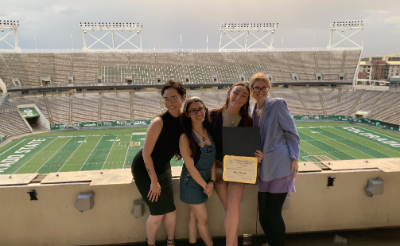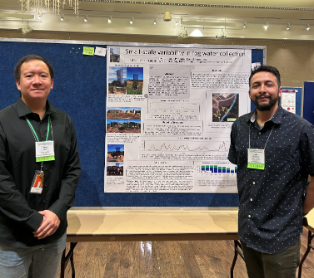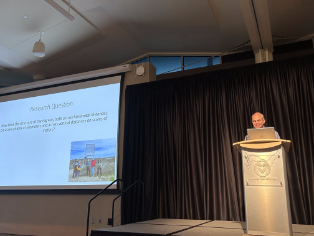Department of Applied Environmental Science
AES Students and Faculty Leave Their Mark at International Fog Conference



Dr. Dan Fernandez and seven of his students (Olivia Equinoa, Michelle Cone, Crystelle Vargas, Hayli Stewart, Joab Pimentel, Kathleen Krasinski, and Tianyi Luo) attended the 9th International Conference on Fog, Fog Collection, and Dew from July 23-July 28, 2023; this year, the conference was held in Fort Collins, Colorado, on the Colorado State University campus. This is the first time that the conference has been hosted in the United States.
In total, the group presented six total posters and one oral session. Additionally, Hayli received an "Outstanding Student Presentation Award" for her research poster. We recently touched base with Olivia (O), Michelle (M), Crystelle (C), Hayli (H), and Joab (J), to learn more about their research projects and their overall conference experience. Check out their interviews below!
In 3-4 sentences, please summarize your research.
O: The Fort Ord Natural Reserve (FONR) in Marina, California hosts endangered and threatened species, including sand gilia (Gilia tenuiflora ssp. arenaria), Monterey spineflower (Chorizanthe pungens var. pungens), and coast horned lizard (Phrynosoma blainvillii). At FONR, there are 10 total fog collectors deployed to observe the spatial variability of fog deposition as it impacts the reserve’s maritime chaparral ecosystem. My project compared the amount of recorded, collected water with the percentage of sand coverage within a 10 meter radius of each fog collector’s location.
M: There are several challenges associated with ground-truthing satellite fog imagery–one is that most fog events take place during the evening and early morning hours and, often, by 10:30 AM, had there been a fog event the preceding night, it is likely to have burned off by the time of the flyover. Another challenge is that there can be a delay of up to 90 minutes between the start of a fog event and the initiation of water collected by a standard fog collector and there can also be a similar delay between the end of a fog event and the cessation of water dripping from the standard fog collector. However, while taking these effects into consideration, our research demonstrates a unique means of quantifying intercomparisons of the MODIS GA V6’s classification of fog events with Dr. Daniel Fernandez’s network of SFCs in the central California coast. This is important for potentially providing the ability to more accurately and reliably measure fog occurrence from satellite, allowing an enhanced ability to track fog hot spots, which are useful from a safety perspective and from the perspective of optimal site location for fog water collection.
C: Fog data was collected between 2019 and 2023 at the Fort Ord Natural Reserve (FONR) in Marina, CA. Over the last semester I was able to help calibrate tipping buckets, assist in taking down and redeploying fog collectors, and restring the nets onto the collectors. After the data was collected, Dr. Dan Fernandez helped me put the data into RStudio and show the results.
H: I researched what mesh for fog collecting was the most efficient at collecting fog water while keeping sustainability in mind. I set up multiple new fog collectors at a site and took data from older collectors that were previously recorded. Then I analyzed the data using R to determine how much fog was collected.
What did you gain from this experience and does this experience contribute to your career goals?
O: I am so grateful to have had the opportunity to attend this conference! I gained insight into other people’s research processes, as well as the challenges that they faced and/or overcame. This conference absolutely contributed to my career goals by providing an immense networking opportunity, as well as the chance to present myself and my work to others with similar interests.
C: I feel so honored to have had the opportunity to attend the FOGDEW conference. Being that this was the first time the conference had been held in the United States, I feel that it was a perfect opportunity to learn more about fog and dew research and what that would mean for my future career plans. I was able to learn so much about how different universities and areas study fog and how their research best suits their areas of research. I intend to work to create sustainable living conditions for underfunded communities and I believe that what I learned at this conference will help me to do so.
H: I gained what I feel is vital knowledge and professional experience doing research when pursuing a career in environmentalism. Hands-on experience not only fueled my interest for what I was researching but also allowed me to gain real world skills that can be used every day as well. I also gained many connections, friendships and an amazing mentor. This research opportunity has given me more confidence entering the post undergrad job search.
What was your favorite part of the conference?
O: Hands down, Dr. Dan playing his mandolin (or dan-dolin, I should say). In all seriousness, my favorite part was the poster sessions, particularly because other students’ work was highlighted in those sessions. Getting to see Graduate and Undergraduate students’ research from all over the world be presented was such a special experience!
J: This conference showed me the importance of communication and networking with fellow peers in the same research area to further push the understanding and progression of that field. My favorite part was the poster session because of the conversation and ideas being bounced back and forth. I plan on furthering into a research field and if available continue to work with fog collectors. I really enjoyed the friendliness everyone projected because I am very new to research and still working on my undergraduate degree.
M: Everyone’s favorite part of the conference was the parts where we didn’t have to use our brains. Read that with the utmost sarcasm. In seriousness, it was so eye-opening to see the internationally-diverse perspectives and lenses that were brought to the world of fog research. It was very fulfilling to see applications of fog collection in a practical and social setting. For those who seek a sense of purpose in applied environmental sciences, there were some really interesting pilot programs that saw PhD candidates working with small-low income municipalities on fog harvesting, sustainability, and resiliency. That made my heart happy.
…But now that you’ve read this in full, my favorite part was seeing our coveted PI (principal investigator), Dan, show a local bluegrass band how it's done. We call that the Danjo!
C: The excursion to the Rocky Mountain National Park was a beautiful experience. I had only left California one other time before this conference and the excursion showed me the mesmerizing nature in Colorado. I was especially excited to see a mother moose with her baby. This was especially rare considering there were only 50 reported moose to be in the park. I was also able to see the view of the Rockies at 12,005ft! It was also on this trip that I was able to see snow for the first time.
H: My favorite part would most of all have to be getting to travel to the international Fog and Dew 2023 conference with people I am happy to call friends. There I was able to make so many more connections and meet amazing people in the field from around the world. Being one of the only undergraduates attending we felt immense pressure to bring our A game. But soon after arriving and getting to know everyone attending, the pressure became a passion to share what all of our hard work has been about. I definitely reveled in the fact that I took home the prize for best poster award. That will forever be one of my most memorable moments. That and getting to watch Dan kill it playing the mandolin and singing!
What are your future plans (career, academic, etc.)?
O: I hope to continue with a career in herpetology; I’ve fallen in love with the coast horned lizard, and now there’s no going back!
M: After spending the last year in the atmospheric-remote sensing world, and graduating from CSUMB in 2023, I’ll be shifting gears by serving as the Tribal Wildfire Resilience Coordinator in Lake County, CA. This is a position housed in the collaborative program between UC Berkeley Law, Americorps, and the US Forest Service, otherwise known as GrizzlyCorps. As for my work with Dan, I am elated to have begun a collaboration with the tertiary author of my research, Zackary Werner, as he hopes to advance the niche field of groundtruthed fog events. For those in the fog and remote sensing world, NASA’s GOES-11 satellite is the standard for detecting and classifying fog and low cloud events. We hope to use my research as a springboard, further creating a hybrid GOES-MODIS model for seeing fog trends along the coast, and validating that with fog events we see on-site. Though being a brainworm right now, this research advancing the field of atmospheric remote sensing could be the precedent of Zack’s pursual of higher education.
C: My future plans consist of working for a while online before going back to school for a master's degree in Environmental Science. I would like to continue applying fog research to any future projects I work on as it can be a very helpful source of water in the future.
H: Although I do not plan to have an extended career in environmentalism, I plan to volunteer my time when I can. But I am pursuing a career in aviation and in the meantime using my amazing experience to get a job that can better the community and the environment. Working in the Fernandez Lab has been one of the best experiences of my undergraduate career. Dan is a very caring mentor and will always be there if you need him to guide you in any way and wants to better your career in any way possible. You couldn’t ask for a better person to guide you on your journey through the research community.
Any advice for fellow students interested in participating in this kind of research?
O: My advice would be to ask questions; there’s no shame in not knowing something! If you’re interested in this kind of research, I would say to reach out and get as much information as you can to figure out what you know, what you want to know, and what areas of this research do or do not interest you! You can dew whatever you put your mind to :-)
M: Being an undergraduate researcher, at a conference catered to graduate students and established professionals, nonetheless, comes with the territory of imposter syndrome. Maybe this is relatable, but as a budding researcher, it's easy to turn into a “yes” person, merely to hold your own in a room of esteemed colleagues. So, if there is any core takeaway or nugget of advice I could give to any young researcher, it would be this–be the shepherd of your own research. During any post-session questions and answer section, do not hesitate to tell people “we did not look into XYZ for this research” etc…You do not need to be able to answer every question out there, rather it shows more expertise to challenge a question and lead your audience back to that “moneyshot” finding–that’s where future research begins.
C: To anyone looking into similar research, I believe it is important to explore various fields and learn about areas you had not considered before. When I first learned about fog research I was curious but did not believe it would apply to my career goals. I was pleasantly surprised as I kept learning about the potentials of fog research and how the sustainable development goals can be applied to them. I encourage anyone who is interested in fog or dew research to give it a shot and hopefully find something new.
H: Even if you do not feel a passion for fog collecting I implore you to give it a shot and maybe you will come to love it and be proud and passionate about your work as I have. You make amazing connections and contacts throughout your time at the Fernandez lab. It is worth every bit of hard work you put into it and you will get just as much out of it if not more. Use your resources and opportunities that being a part of this lab has opened up for students like me; you won’t likely get the chance again after college. Good luck!
Congratulations to you all! We look forward to seeing where your professional and academic endeavors take you!